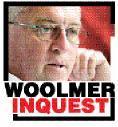Howard Campbell, Gleaner Writer

THE CORONER'S inquest into the death of Pakistan cricket coach Bob Woolmer ended yesterday at the Jamaica Conference Centre with an 11-member jury returning an open verdict.
The jury deliberated for over three hours before presenting their verdict to coroner Patrick Murphy. The jury foreman, who declined to give his name, said he and his colleagues believed there were too many unanswered questions, and this influenced their conclusion.
"We came to an open verdict because the evidence was too weak. There were too many what-ifs and loopholes," he said.
He added that the prosecution did not follow up on certain leads until they came before the court, which left jurors at a disadvantage. The police team that investigated the case were also criticised.
"There were certain instances that a conclusion wasn't drawn and we had to speculate, and that forced us to come to a conclusion for ourselves," he said.
The inquest was ordered on March 23, five days after Woolmer was pronounced dead at the University Hospital of the West Indies. He was found in the bathroom of his room at the Jamaica Pegasus hotel early on March 18.
Initially, government pathologist Dr. Ere Seshaiah said Woolmer died from asphyxia caused by manual strangulation. During his testimony at the inquest, he added cypermethrin poisoning to his analysis. He testified that he saw traces of the pesticide in Woolmer's system from the toxicology report in June.
Seshaiah's technique questioned

MURPHY
But three overseas pathologists - Dr. Nathaniel Cary of Britain, Dr. Michael Pollanen of Canada and South African professor, Lorna Jean Martin - questioned Seshaiah's autopsy technique. They agreed that Woolmer, a diabetic with an enlarged heart, died from natural causes.
The jury foreman said the issue of cypermethrin was not a major factor during the deliberations. While X-rays shown at the inquest ruled out strangulation, he said Dr. Seshaiah had an advantage over his overseas colleagues, having performed the autopsy.
"They were in an unfair situation, because they were not able to decide properly, not given all the information on the total picture," he said.
Woolmer was pronounced dead one day after Pakistan, one of the favourites for the Cricket World Cup, were eliminated by unheralded Ireland at Sabina Park in Kingston.
The former England player's death overshadowed the tournament, and triggered speculation that he was murdered by members of a syndicate that operated lucrative gambling networks throughout the cricket-mad subcontinent.
On June 12, at a press conference at the Police Officers' Club in St. Andrew, then Police Commissioner Lucius Thomas announced that Woolmer died from natural causes and declared the case closed.
Fifty-seven witnesses testified during the 31-day inquest. Kent Pantry, Tanya Spence and Dirk Harrison represented the office of the Director of Public Prosecutions, while Jermaine Spence and Kedian Francis of DunnCox represented the International Cricket Council.

